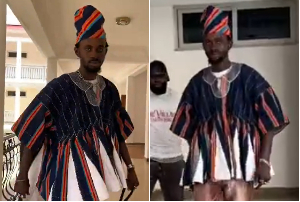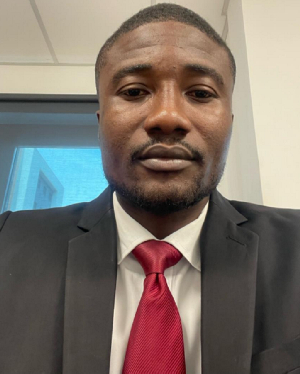The government on Thursday affirmed that it would go ahead with its bid to push for a review of the Supreme Court's 5-4 verdict on the unconstitutionality of the Fast Track High Court now that the justices had given their reasons.
"Yes, we will," the Minister of Information and Presidential Affairs, Mr Jake Obetsebi-Lamptey said, when asked whether the government would go ahead to ask for a review.
According to a GNA report, the government did not want a disruption in the dispensation of justice and review would ensure; "that the previous cases, the civil cases, will stand and we will be free to go ahead with the modernisation of our courts.
Mr Obetsebi-Lamptey said the government was determined to strengthen the judiciary as an institution and the country's democracy. He said the Attorney -General was putting the papers together and would file them soon.
The Minister dismissed criticisms that the government indicated its stand to seek a review even before the Supreme Court justices had given reasons for their decision saying they had to do that to beat the time. "There is a time bar that you had to beat," he said, adding that the date fixed for reading out the reasons for the verdict fell after the time bar.
The Supreme Court on February 28 upheld arguments of counsel for Mr Tsatsu Tsikata, former Chief Executive of the Ghana National Petroleum Corporation (GNPC), that the Fast Track High Court was unconstitutional but deferred the reasons until Wednesday.
Mr Tsikata had sought: "A declaration that there is no 'Fast Track Court' to try criminal cases established under the Constitution of the Republic of Ghana, and there is, therefore, no constitutional foundation for the Plaintiff to be prosecuted before such court;
"A declaration that the oral demand by agents of the Defendant to Plaintiff to appear before a 'Fast Track Court' when no such court for trial is provided for in the Constitution of Republic of Ghana, is an infringement of Articles 125 and 126 of the Constitution establishing the Judiciary; "An injunction against the Defendant and their agents restraining them from seeking to proceed with a trial of the Plaintiff before the purported 'Fast Track Court'."
Mr Tsikata was charged with wilfully causing financial loss of 2.15 billion cedis to the State. He allegedly circumvented laid-down corporate objectives of GNPC when he by-passed its Board and on his own, committed the GNPC to guarantee a loan for Valley Farms Limited, a private cocoa-growing venture in which GNPC had 17.39 per cent shares.
The loan of 5.5 million French Francs was granted by Caisse Francaise de Developpement, a French aid agency, and when Valley Farm defaulted in the repayment of the loan Mr Tsikata without prior approval of the GNPC's Board, allegedly paid out the principal amount plus interest, all totalling 6,919,123.23 French Francs from GNPC operational accounts thus causing financial loss to the state.
The five justices of the Supreme Court, who declared the Fast Track High Court unconstitutional on February 28, said the it was not known to the Constitution, when they gave their reasons.
The five, who were in the majority were: Mrs Justice Joyce Bamford-Addo, Mr Justice A. K. B. Ampiah, Mr Justice F. Y. Kpegah, Mr Justice E. D. K. Adjabeng and Mr Justice Theodore Adzoe.
They explained that in making provision for the administration of justice, the Constitution did not establish any court known, as the FTC neither had Parliament under Article 126 (i) (b) of the Constitution exercised its power to establish any such court.
They pointed out that Parliament in the exercise of its powers under the same article had established circuit and community tribunals under the Courts Act; Act 459 of 1993 sections 40 and 46 and granted them specific criminal jurisdiction. They said there has been no similar legislation creating any FTC.
The four justices, who dissented, were: Chief Justice Edward Kwame Wiredu, Mr Justice George Acquah, Mr Justice Williams A. Atuguba and Ms Justice Sophia A. B. Akuffo.
They said the reasons adduced by the majority were porous and legally untenable. They argued that all the courts were constitutionally established and that the Fast Tract High Court High Court was only a division of the High Court and wondered why the plaintiff said it was unconstitutional.
The Minority explained that there are High Courts in all the regional capitals and some of the district capitals including Denu, Hohoe, Nkwakwa and Mampong and that they were established under the 1992 Constitution with the aim of bringing justice to the doorsteps of many Ghanaians and no parliamentary approval was sought.
They said the FTC is an ordinary High Court with innovations- new technology to facilitate the process of justice delivery. The FTC was a division of the High Court at an experimental stage but when all the High Courts became automated the adjective "Fast Track" would no longer apply, they said.
They stressed that the Fast Track Court was essentially a division of the High Court with improved facilities that followed the normal procedure of the traditional High Courts.
Following the Supreme Court's decision Mr Tsikata was arraigned at a normal High Court where he also won another legal battle when the court upheld his contention that the charge was unconstitutional.
The court upheld his arguments that the charge under which he was charged took effect in July 1992 while he was alleged to have committed the offence in February 1992.
General News of Friday, 22 March 2002
Source: gna












